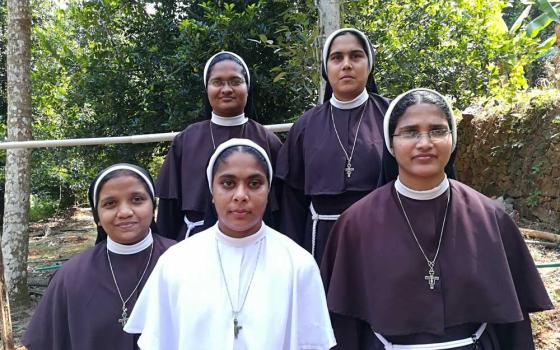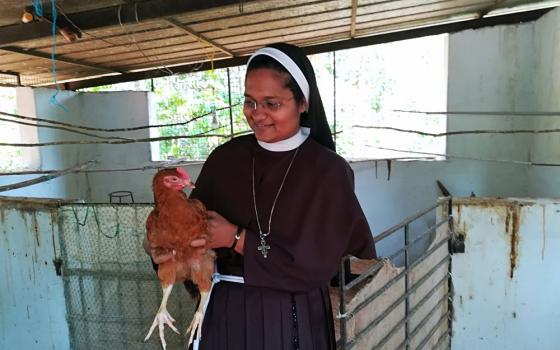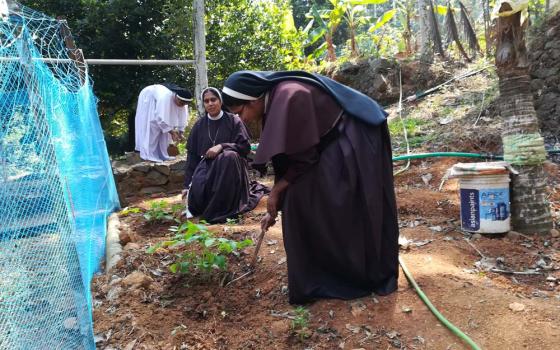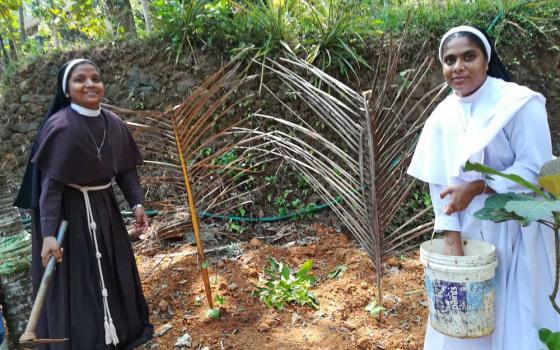As the Vatican grapples to devise stronger protocols and responses following a historic summit focused on clergy sex abuse of minors, five nuns in India complain of church repression for their support of a former superior general who was allegedly raped by a bishop.
"The Catholic Church leadership has been treating us as outcasts after we went public against Bishop Franco Mulakkal [of Jalandhar]. Even the Vatican has not bothered to acknowledge our complaints," says Sr. Anupama Kelamangalathuveli, the spokesperson for five Missionaries of Jesus nuns who in September last year staged a sit-in for the bishop's arrest.
The sisters seek attention from the Vatican to the plight of women religious abused by clergy, with clearer protocols and more protection. For now, the five sisters are living with the victim in a convent in Kerala, refusing orders to return to their own communities while the case is ongoing. They are caught in a wrangle between a bishop who supports their refusal and their congregational leadership. Meanwhile, they endure the rancor of sisters in their community who ridicule them and discount the victim's allegations.
The five sisters rallied behind their former superior general who on June 28 complained to the police in Kerala, southern India, that Mulakkal had sexually abused her multiple times from 2014 to 2016. Kelamangalathuveli says the victim first wrote to church authorities in January 2017, the apostolic nuncio in India in January 2018, and then to the pope on May 14, seeking church action against Mulakkal. She copied prefects of the Congregation for the Doctrine of the Faith and the Congregation of Bishops, and later sent reminders before going to the police. She has gotten no response, Kelamangalathuveli says.
The 54-year-old Mulakkal has consistently denied the allegations and claimed that the case was due to the nun's personal vendetta for his initiating disciplinary action against her. He was then the patron of the congregation that comes under the Jalandhar Diocese in northern India.
However, he stepped down from diocesan oversight in mid-September and the Vatican on Sept. 20 appointed Bishop Agnelo Rufino Gracias as the Jalandhar Diocese's administrator.
Kelamangalathuveli says the only positive gesture they have received from the church so far has come from Gracias. The administrator stayed an order from Missionaries of Jesus Superior General Sr. Regina Kadamthottu asking four of the nuns to return to their assigned convents.
Having learned about the alleged rape and early backlash against the victim, the four nuns – Josephine Villoonnickal, Alphy Pallasseril, Ancitta Urumbil, and Kelamangalathuveli – rushed to offer moral support in April before the complaint was filed. They left their convents in different parts of India and came to St. Francis Mission Home in Kuravilangad, Kerala, the congregation's convent where the rape survivor lives along with their fifth companion, Sr. Neena Rose.
The five then joined a sit-in in September at Kochi in Kerala to call for Mulakkal's arrest. The protest was organized by the Save Our Sisters Action Council, a forum comprising mostly laypeople to help Catholic women religious in distress. The nuns' protest, with support from hundreds of people and social groups, ended with Mulakkal's arrest on Sept. 21 and subsequent imprisonment. The bishop was granted bail by the Kerala High Court on Oct. 15.
However, the protest earned the nuns the wrath of church bodies, such as the Kerala Catholic Bishops' Council, which condemned them for stirring up enemies of the church. Their superior and her council issued the transfer orders requiring them to return to their original convents.
On Feb. 3, Bishop Gracias stayed Kadamthottu's transfer orders and asked the four sisters through email to remain at Kuravilangad until the case was completed.
"It was the first official communication we got from a church authority. We felt delighted," Kelamangalathuveli told Global Sisters Report.
Gracias' intervention came after several social leaders and rights groups condemned Kadamthottu's orders as an attempt to intimidate the five key witnesses and weaken the case.
One supporter, Hindu social reformer and activist Swami Agnivesh, wrote to Pope Francis on Jan. 21 to help the five nuns who he said were facing church backlash for demanding justice.
"It is indeed shocking that the concerned diocese and its religious orders go easy on the alleged rapist while it is targeting those who stood and struggled for justice for the victim," said the 79-year-old Hindu leader.
Agnivesh, who has often protested persecution of Christians in India, pointed out that Indians respect the five nuns for their "bold stand" in support of an "oppressed victim."
At the same time, he regretted that the church's image in India suffered greatly because of its failure to "respond proactively" to the nun's sexual abuse complaint.
Save Our Sisters also came to the nuns' rescue. It wrote to Kerala Chief Minister Pinarayi Vijayan on Jan. 26 urging him to protect the five nuns. More than 50 social activists, journalists, teachers and writers endorsed the SOS letter.
The letter alleged that the transfer orders were the congregation's attempts to move the key witnesses out of the Kerala police jurisdiction and make them vulnerable to intimidation by Mulakkal and his supporters.
It also points out that Kadamthottu is a "strong supporter" of Mulakkal and has voluntarily defended him before the police and media.
The congregation clarified that the transfer order did not "intend to make any sort of intervention or interference into the due process of law and justice." The five nuns, it said, can appear before investigation officers and courts whenever needed.
At the same time, the nuns should not use the case as an excuse "to compromise our affirmed religious values and principles of religious life," it asserted.
The five sisters ignored the orders, labeling them as part of "a well-orchestrated strategy" to sabotage the case. "They know our sister [the victim] will not be able to fight the case if she is isolated. They can then win the case easily," says Kelamangalathuveli, speaking in Malayalam, the official language in Kerala.
The sisters also say they fear for their lives if they are separated before the case is over.
Rose, who was asked to be in Jalandhar on Jan. 26 to explain her reasons for joining the sit-in, says complying with the order would have been "suicidal" for her because Mulakkal resides in that city.
"Bishop [Mulakkal] is so powerful that he could do anything with me if I reached there," she told GSR in early February.
Kelamangalathuveli was asked to return to her original convent in Jalandhar. Villoonnickal was asked to go to Jharkhand and Pallasseril to Bihar, both states in eastern India. Urumbil was originally posted at another convent in Kerala.
Gracias expressed surprise and dismay over the transfer orders and said he was away from Jalandhar when they were issued on Jan. 3.
"I am giving a directive to the (superior) General that she will not issue any letters to the five of you without my explicit permission. This will be an order to her from me as Apostolic Administrator in charge of the Congregation — since it is of Diocesan Right, it comes under me," the bishop's letter to the five women said.
The prelate also assured the nuns that "as far as [it] lies within my power, there will be no move from the Diocese of Jalandhar to oust you from the Kuravilangad Convent as long as you are needed for the court case."
Gracias later said to GSR by phone, "Canonically it is true that they are supposed to go back to their respective places of posting, however, in view of the current situation, it is not possible for them to do so."
The superior general did not respond to several calls from GSR.
However, Jalandhar Diocese's public relations officer, Fr. Peter Kavumpuram, issued a clarification on Bishop Gracias' letter to the nuns saying the bishop normally does not interfere in the congregation's internal matters, and, "therefore the order to return to their rightful communities by the Mother General is not canceled but stands."
But Kelamangalathuveli says she and the other four sisters are not swayed by Kavumpuram's statement because he had filed a bogus case against the victim and her family members on behalf of Mulakkal to deter them from filing a rape complaint with police. The case was dropped due to insufficient evidence.
"He is only a priest and not above the bishop," she says.
Meanwhile the Kerala government stepped up security for the five nuns after Fr. Kuriakose Kattuthara, another witness in the case, died under mysterious circumstances four days after Mulakkal returned to Jalandhar following his release on bail. The autopsy report said the death was natural, but the priest's friends suspect otherwise, saying he was under great mental strain after the bishop was freed on bail.
The police requested the congregation install closed-circuit TV cameras and meet other basic requirements in their Kuravilangad convent.
The superior general wrote back saying the congregation has no money and that she had no objection if the police shifted the five nuns to a government shelter.
"This was another ploy from the superior to dismiss us from the congregation," Kelamangalathuveli alleges.
Villoonnickal told GSR that they would not move out of the Kuravilangad convent until the case ends, "whatever happens."
The rape case and the nuns' protest have become a watershed in the Indian church, says Fr. Augustine Vattoly, who was the SOS convener until he was recently pressured by the diocese to step down.
"While the case exposed the church, the nuns' protest became part of the Indian church history. The five will be proved right sooner or later," he said.
The activist priest regretted that many bishops have openly exonerated Mulakkal and visited him in jail, giving the impression the church is siding with the accused. "No one has bothered to see the protesting nuns or the victim," Vattoly said.
The case, he adds, is "a gift from the Holy Spirit" to cleanse the church from within.
Urumbil says many bishops have passed through on the road close to their convent, but "no one has come to see us until now."
Kelamangalathuveli says the Kuravilangad convent has four other nuns, all Mulakkal supporters, who often taunt and harass the rape survivor and the other five sisters.
The local superior asked them not to work in the garden and threatened to file a police case against workers the sisters had called to assist them.
"We were impeded from growing vegetables, rearing poultry and other work," she says, and adds that the Mulakkal supporters "even threatened the workers we called to till the earth for cultivating vegetables."
Life in the convent has been tense, Kelamangalathuveli said. All 10 nuns come together only when they have occasional Mass in the convent. Otherwise the two groups pray separately.
The five nuns were able to persevere in planting their garden. Pallasseril says the kitchen garden and poultry farm give them positive energy in their stressed life.
"We all come together to water the plants and feed the chickens regularly to divert our attention from the case and breathe some fresh air. It is really recharging and entertaining to be in the garden," Pallasseril says.
The five find time to pray together, meditate and share their experiences with each other. They sit before the tabernacle and read the Bible to draw strength from God and each other, and are thankful for supporters of their struggle.
K.V. Rajan, a Hindu who participated in the nuns' protest, says "serious injustice" has been done to the nuns and that people should come forward to correct and control the church leaders. "People should not fear the leaders but the leaders should fear the people," he told GSR.
"We get prayers and support from people from all walks of life," Kelamangalathuveli says. "Strangers meet us on the road or in public transport and encourage us to continue our fight."
[Saji Thomas is a freelance journalist based in Bhopal, a central Indian city. He has worked for several mainstream newspapers such as The Times of India. This article is part of a collaboration between GSR and Matters India, a news portal that focuses on religious and social issues in India.]








